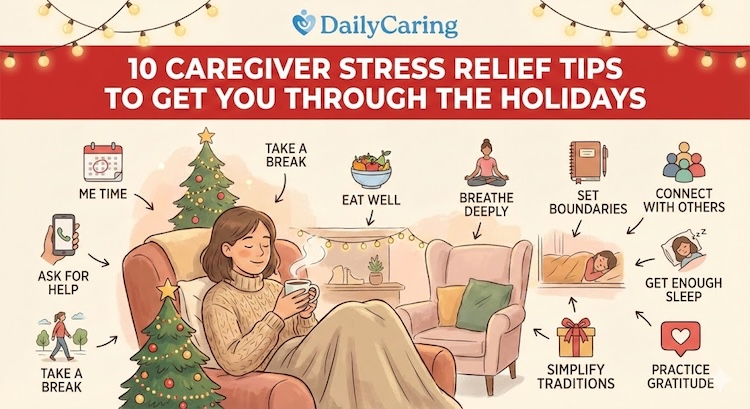If you’re feeling stretched thin, constantly tired, and emotionally drained, you’re not alone—you’re experiencing the very real weight of caregiver stress. In the relentless rhythm of caring for a loved one, your own well-being often slips to the bottom of the list until the pressure becomes overwhelming.
But managing this stress isn’t a luxury; it’s a critical part of sustaining your ability to give compassionate care. The good news is that relief doesn’t always require large chunks of time or dramatic changes.

Here are 14 practical, manageable ways to ease the pressure, reclaim moments of peace, and restore your energy starting today.
Caregiver Stress is Unavoidable, but it can be Managed
Stress is an inevitable part of being a caregiver.
But for long-term health and well-being, it’s essential to find ways to take care of ourselves and manage stress.
In addition, when we’re feeling better, we can be even better caregivers.
To help with that, put together a list of 14 practical stress relief tips for busy caregivers and added suggestions for how to make them work in everyday caregiving situations.
14 Top Tips to Reduce Caregiver Stress
1. Just Breathe
Deep breaths increase the amount of oxygen in your blood, which helps you relax instantly.
Shallow breathing makes your heart beat faster and your muscles tense – intensifying your stress.
When you feel stressed, put your hand near your belly button. Inhale slowly through your nose and watch your hand move out as your belly expands. Hold your breath for a few seconds, then exhale slowly.
Repeat several times.
2. Visualize Calmness
This might sound hokey, but studies have found that visualization helps relieve stress.
When you feel tense and frustrated, imagine yourself in a calm, relaxing situation. Think about the details – how it looks, sounds, and smells.
For example, imagine that you’re in a hot, soothing shower with lavender-scented soap, and your stress is washing down the drain.
Or, you’re walking on a warm beach, listening to the crashing waves, smelling the salt air, and watching a beautiful sunset.
3. Make Time for a Mini Self-Massage
A full-on massage in a spa would be ideal, but when that’s not possible, self-massage is still a great way to cope with caregiver stress.
Make circular motions with your thumb to massage the palm of your other hand.
Or, get an inexpensive massage gadget to soothe your neck, shoulders, and body.
Here are three great options: HoMedics Quatro mini massager, ENOWPO rechargeable mini massager, Shiatsu back & neck massager.
4. Smile – Even if you Don’t Feel Like It
Smiling works in two ways. We do it when we’re happy, but smiling can also make us feel happier.
So even if you’re feeling crappy, go ahead and paste a big smile on your face. Soon you’ll actually start to feel better!
5. Use Positive Affirmations: Say them Outloud
Affirmations also sound hokey, but they do work.
When you tell yourself something positive, it helps you cope with whatever is happening.
A helpful mantra could be something like:
- I feel calm, and I can handle this.
- It will be ok, I can do this.
- I am good at this. I can handle this.
- One thing at a time.
When you’re feeling overwhelmed, anxious, or hopeless, repeat your stress-relieving mantra 10 times.
6. Adopt a Fighter’s Mentality
Thinking things like “Why do I have to be the one taking care of mom?” or “What did I do to deserve this?” only adds to your stress.
When you feel like a victim, you’ll be filled with self-pity and hopelessness.
If you focus on being proactive and work to improve your situation, you’ll feel more in control and less stressed.
7. Write Down Your Thoughts
Writing down your thoughts helps get them out of your head and gives you a better perspective on what's bothering you.
A helpful exercise is to divide a piece of paper into two parts.
On one side, write down things you might be able to change, like finding caregiving help. On the other hand, write down the things you can’t change, like being the primary caregiver.
Focus on the things you can change because stressing over things you can’t change only hurts yourself.
8. Count to 10
Caregiving is frustrating, and your older adult might get on your last nerve several times a day.
Before you say or do something you might regret, step away and give yourself a minute to collect yourself before you respond.
Count to 10, take five deep breaths, or do three stretches – whatever you need to calm down and reason again.
9. Try Aromatherapy
Essential oils like lavender, peppermint, rose, and eucalyptus are soothing and relaxing.
To make a simple scent diffuser, put a few pieces of rock salt in a small container and add a few drops of an essential oil.
Anytime you feel stressed, open the container and breathe in the relaxing scent.
You could also get an aromatherapy oil diffuser to create a soothing scented atmosphere in the room.
Some caregivers have said that using these types of room diffusers is an excellent way for both them and their older adult to feel more relaxed.
10. Loosen your Neck and Shoulders
Most people carry stress in their neck or shoulder muscles.
Loosening them up helps you literally shake off some of the stress.
Stand or sit, stretch your arms out to your sides, and vigorously shake your hands for about 10 seconds.
While you’re at it, take a few deep breaths – that doubles the stress relief.
11. Move Your Body – Take a Walk
Getting up and moving around helps you breathe more deeply and increases circulation.
Suppose you can, go for a brief walk outside. If you aren’t able to leave the house, walk around inside your home.
12. Take a Warm Soak
When you get a chance to take a break, take a hot bath or shower, soaking helps your body relax and release tension.
If you don’t have time for a bath, wash your face, hands, or arms with warm or hot water. While you’re doing that, imagine that you’re taking a relaxing bath.
13. Immerse Yourself in Music
Music is an excellent way to relieve stress and boost mood.
Classical music has been shown to have many stress-relieving benefits, but almost any kind of music can have a similar effect.
The next time you’re feeling overwhelmed, listen to classical music or some of your favorite tunes.
Get an extra relaxation bonus by dancing like nobody’s watching.
14. Stretch Your Body
Muscles naturally tighten up over the day, and when we’re stressed, they get even more tense.
Take some time to relax and release stress with quick stretches or gentle yoga, accompanied by slow, deep breathing.
Final Thoughts
Remember, tending to your own well-being is not an act of selfishness; it’s an essential practice that fuels your capacity to care for someone else. You don’t need to implement all 14 strategies at once. Even choosing one or two can create a meaningful ripple effect of calm in your daily life.
Let this list be your invitation to pause, breathe, and take one small step toward a lighter, more balanced you. By proactively managing stress, you’re not just surviving your caregiving journey; you’re building the resilience to navigate it with greater strength, patience, and grace. You deserve this care, too.
Recommended for you:
- 15 Affordable Stress Relief Products That Help Caregivers Relax and Unwind
- Caring for the Caregiver: 6 Ways to Get Help and Improve Your Health
- Caregivers Get Speedy Meditation Benefits with 4 Simple Apps
This article contains some affiliate links. If you buy through an affiliate link on our site, we may earn a small commission, at no additional cost to you. For more information, see How We Make Money.
About the Author

Connie is the founder of DailyCaring.com and was a hands-on caregiver for her grandmother for 20 years. (Grandma made it to 101 years old!) She knows how challenging, overwhelming, and all-consuming caring for an older adult can be. She also understands the importance of support, especially in the form of practical solutions, valuable resources, and self-care tips.













